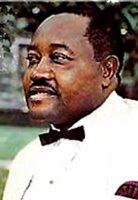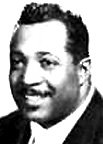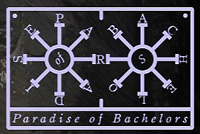The Soul Stirrers - Stand By Me Father (SAR 101)

Stand By Me Father
When Sam Cooke 'crossed-over' in 1956, it's important to remember that he was not only changing the nature of the material he covered, he was also walking away from what many consider to be the best Gospel 'quartet' of all time. That was something that neither he nor the rest of The Soul Stirrers ever really got over.
 Faced with the loss of their charismatic and immensely popular lead vocalist, the group was hard pressed to come up with a replacement. According to Sam Moore, who had opened for the Stirrers as a member of Miami Gospel group The Melionaires, they offered him the job. The night before he was supposed to join the group, Sam went to see Jackie Wilson. "I saw the electrification, the excitement... that's what I want to do," Moore said, and when the Soul Stirrers came looking for him he was gone. They then hired Little Johnny Jones, who was the lead singer of The Swanee Quintet, but he couldn't handle it, and quit to return to Georgia in the Summer of 1957.
Faced with the loss of their charismatic and immensely popular lead vocalist, the group was hard pressed to come up with a replacement. According to Sam Moore, who had opened for the Stirrers as a member of Miami Gospel group The Melionaires, they offered him the job. The night before he was supposed to join the group, Sam went to see Jackie Wilson. "I saw the electrification, the excitement... that's what I want to do," Moore said, and when the Soul Stirrers came looking for him he was gone. They then hired Little Johnny Jones, who was the lead singer of The Swanee Quintet, but he couldn't handle it, and quit to return to Georgia in the Summer of 1957. They next turned to Chicago, and the place where they had found Sam Cooke in the first place, local gospel quartet The Highway QCs. The QCs had recently added a brash young singer who, everybody agreed, sounded almost exactly like Cooke (for more info on that, please check out the B side). Soul Stirrer guitarist Leroy Crume went to visit him in the wee hours of the morning one day in June of 1957, and sat with the then 19 year old Johnnie Taylor on the steps of his house explaining what it would take for him to become their new lead vocalist. He told him he'd have to make up his mind right then and there, and Johnnie ended up leaving with Crume for Atlanta as the Stirrers' newest member.
They next turned to Chicago, and the place where they had found Sam Cooke in the first place, local gospel quartet The Highway QCs. The QCs had recently added a brash young singer who, everybody agreed, sounded almost exactly like Cooke (for more info on that, please check out the B side). Soul Stirrer guitarist Leroy Crume went to visit him in the wee hours of the morning one day in June of 1957, and sat with the then 19 year old Johnnie Taylor on the steps of his house explaining what it would take for him to become their new lead vocalist. He told him he'd have to make up his mind right then and there, and Johnnie ended up leaving with Crume for Atlanta as the Stirrers' newest member. They would tour that summer, and were one of the headliners in the 'Big Gospel Cavalcade', an ambitious traveling Gospel revue that included Clara Ward, The Sensational Nightingales, and The Five Blind Boys Of Alabama. Although none too happy about it, Art Rupe continued to record them, but his focus was already shifting away from Gospel at this point. When their new releases failed to sell the way they used to, The Soul Stirrers were dropped by Specialty Records in late 1958. They were offered a contract by Vee-Jay in Chicago, but Sam Cooke convinced them to let him record them instead.
 With his best friend and business partner J.W. ('Alex') Alexander (pictured here with fellow Pilgrim Traveler Lou Rawls), Sam decided to start a new record company specifically for that purpose. It would be called SAR, as in Sam, Alex and Roy - the Roy being Roy Crain, the founding member of the Stirrers that Sam insisted on including in the deal.
With his best friend and business partner J.W. ('Alex') Alexander (pictured here with fellow Pilgrim Traveler Lou Rawls), Sam decided to start a new record company specifically for that purpose. It would be called SAR, as in Sam, Alex and Roy - the Roy being Roy Crain, the founding member of the Stirrers that Sam insisted on including in the deal. They began working up material for them right away, with Sam and Alex taking an old Charles Tindley hymn called Stand By Me and turning it into the phenomenal song that you're listening to now. Flying to Chicago, they booked studio time for early September of 1959.
 They brought Sam's regular studio guitar wizard (and former Ink Spot), Clif White with them to join with Leroy Crume on the session. With the rest of the group's mournful wail behind him, Johnnie Taylor lays down an incredibly soulful vocal here that makes this one of my favorite Soul Stirrers records ever.
They brought Sam's regular studio guitar wizard (and former Ink Spot), Clif White with them to join with Leroy Crume on the session. With the rest of the group's mournful wail behind him, Johnnie Taylor lays down an incredibly soulful vocal here that makes this one of my favorite Soul Stirrers records ever.Released as SAR's first single later that year, J.W. Alexander thought it had serious 'crossover potential', and was able to garner some airplay on top 40 radio shows like Alan Freed's. The fact that the general public thought it was Sam Cooke singing lead (and nobody said anything to make them think otherwise) helped, I'm sure.
In early 1960, the car Johnnie Taylor was driving struck a young girl who had run out in front of him. Although the girl wasn't seriously hurt, when the police responded they locked Taylor up for driving 'under the influence of marijuana'. When the rest of the Soul Stirrers showed up to bail him out, it was obvious that they were concerned about how this might affect the group's image. Johnnie decided to quit before he was fired, becoming an itinerant preacher named "The Reverend Johnnie Taylor (formerly of The Soul Stirrers)".
He would be back knocking on SAR's door by April of 1961... (you can read more about that, here.)
























